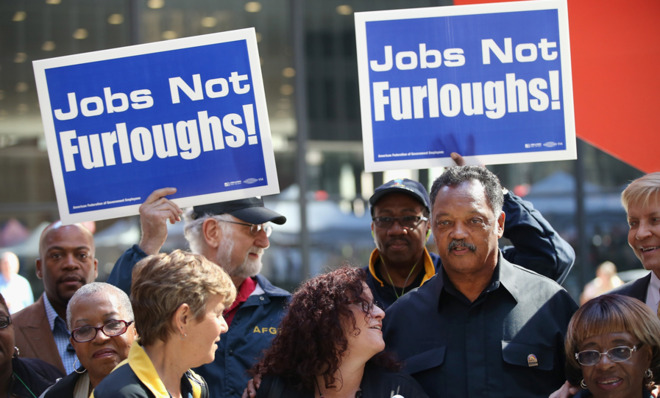October jobs report: The shutdown didn't destroy the economy
The U.S. economy added 204,000 jobs last month — nearly double what was expected

A free daily email with the biggest news stories of the day – and the best features from TheWeek.com
You are now subscribed
Your newsletter sign-up was successful
How bad did the government shutdown hurt the economy? It turns out it wasn't the end of the world after all.
The big news from today's employment report from the Labor Department was the number of jobs added in October: 204,000, more than double what was expected, as MSNBC's Suzy Khimm noted.
Not only that, but the Labor Department revised its numbers for the past two months, adding 60,000 jobs in August and September to its previous estimates. The unemployment rate did rise to 7.3 percent, from 7.2 percent — mostly because the government counted temporarily furloughed workers as unemployed. Here's CBS' Mark Knoller:
The Week
Escape your echo chamber. Get the facts behind the news, plus analysis from multiple perspectives.

Sign up for The Week's Free Newsletters
From our morning news briefing to a weekly Good News Newsletter, get the best of The Week delivered directly to your inbox.
From our morning news briefing to a weekly Good News Newsletter, get the best of The Week delivered directly to your inbox.
Overall, this is a pretty good jobs report, even by non-shutdown standards. The biggest winners were manufacturing and the service sector. The Washington Post's Reid Wilson:
What does this jobs report mean for the U.S. economy in general? Like yesterday's GDP numbers, it indicates that America is recovering — but not quickly or robustly enough to make a difference to many Americans.
As the progressive Economic Policy Institute notes, the United States would still need to add 8 million jobs to reach pre-recession levels of employment. And the jobs that Americans do have aren't necessarily paying all the bills, writes The Wall Street Journal's Michael J. Casey:
We might be adding jobs but it's not doing much for the bottom line of those who already have one. The two-cent increase in average weekly earnings to $24.10 puts the monthly increase below 0.1 percent… On an inflation-adjusted basis, the American worker is still doing very badly. It's another reminder that [quantitative easing] from the Fed has done wonders for the owners of financial assets but not much at all for Main Street. [Wall Street Journal]
That's a reference to the Federal Reserve's quantitative easing program, in which the central bank buys $85 billion worth of Treasuries and mortgage-backed assets a month to encourage the flow of credit. Indeed, the fact that the labor market appears to be on solid ground could lead the Fed to begin winding down the program, a process that is widely referred to as tapering.
A free daily email with the biggest news stories of the day – and the best features from TheWeek.com
But it's also too early to declare how, exactly, the government shutdown affected the economy. A single month's jobs report — especially under such unusual circumstances — includes a lot of noise.
"It will be difficult to tell how much is from the shutdown and how much is the underlying trend," Dean Maki, chief U.S. economist at Barclays, told The New York Times. "There won't be a clean way to do it."
Keith Wagstaff is a staff writer at TheWeek.com covering politics and current events. He has previously written for such publications as TIME, Details, VICE, and the Village Voice.
-
 ‘Restaurateurs have become millionaires’
‘Restaurateurs have become millionaires’Instant Opinion Opinion, comment and editorials of the day
-
 Earth is rapidly approaching a ‘hothouse’ trajectory of warming
Earth is rapidly approaching a ‘hothouse’ trajectory of warmingThe explainer It may become impossible to fix
-
 Health insurance: Premiums soar as ACA subsidies end
Health insurance: Premiums soar as ACA subsidies endFeature 1.4 million people have dropped coverage